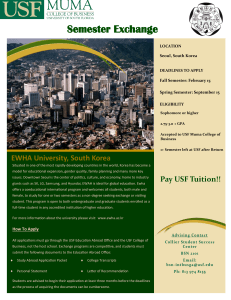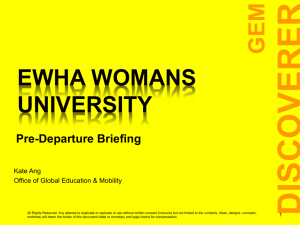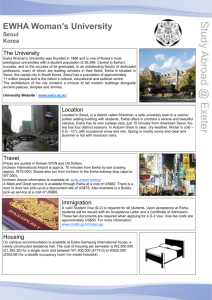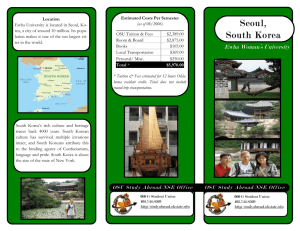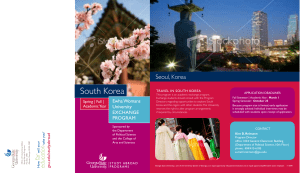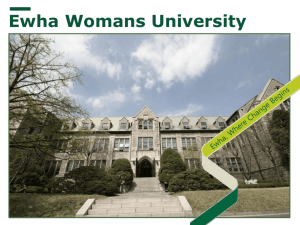South Korea, Seoul Fall semester 2010
advertisement
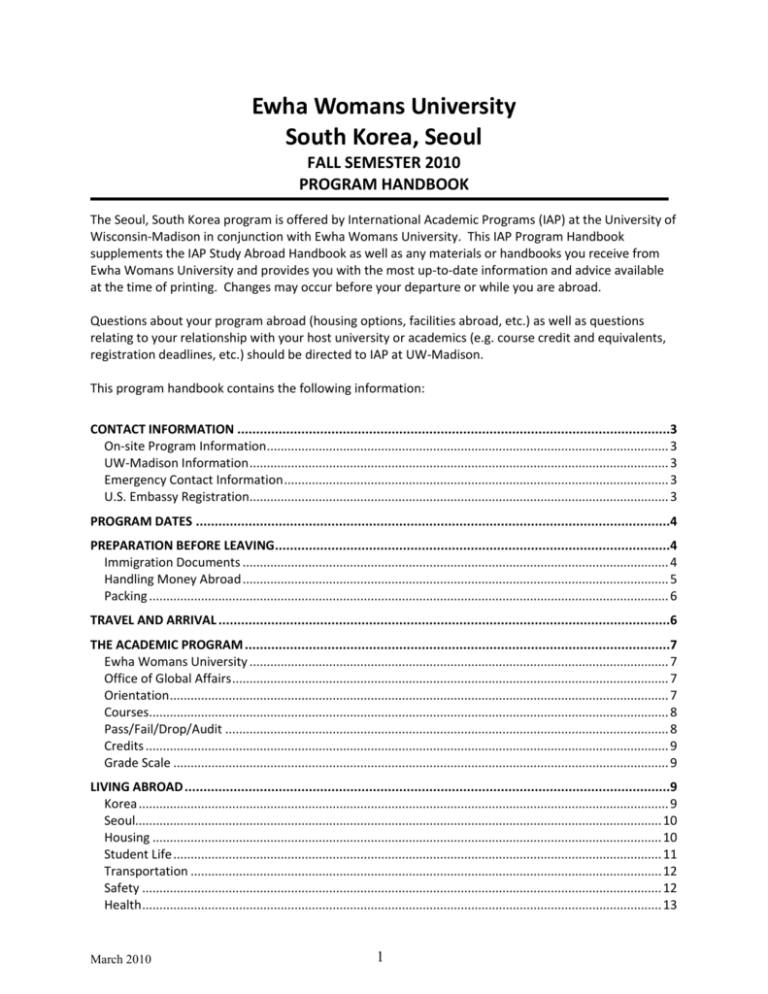
Ewha Womans University South Korea, Seoul FALL SEMESTER 2010 PROGRAM HANDBOOK The Seoul, South Korea program is offered by International Academic Programs (IAP) at the University of Wisconsin-Madison in conjunction with Ewha Womans University. This IAP Program Handbook supplements the IAP Study Abroad Handbook as well as any materials or handbooks you receive from Ewha Womans University and provides you with the most up-to-date information and advice available at the time of printing. Changes may occur before your departure or while you are abroad. Questions about your program abroad (housing options, facilities abroad, etc.) as well as questions relating to your relationship with your host university or academics (e.g. course credit and equivalents, registration deadlines, etc.) should be directed to IAP at UW-Madison. This program handbook contains the following information: CONTACT INFORMATION ...................................................................................................................3 On-site Program Information.................................................................................................................... 3 UW-Madison Information ......................................................................................................................... 3 Emergency Contact Information ............................................................................................................... 3 U.S. Embassy Registration......................................................................................................................... 3 PROGRAM DATES ..............................................................................................................................4 PREPARATION BEFORE LEAVING.........................................................................................................4 Immigration Documents ........................................................................................................................... 4 Handling Money Abroad ........................................................................................................................... 5 Packing ...................................................................................................................................................... 6 TRAVEL AND ARRIVAL ........................................................................................................................6 THE ACADEMIC PROGRAM .................................................................................................................7 Ewha Womans University ......................................................................................................................... 7 Office of Global Affairs .............................................................................................................................. 7 Orientation ................................................................................................................................................ 7 Courses...................................................................................................................................................... 8 Pass/Fail/Drop/Audit ................................................................................................................................ 8 Credits ....................................................................................................................................................... 9 Grade Scale ............................................................................................................................................... 9 LIVING ABROAD .................................................................................................................................9 Korea ......................................................................................................................................................... 9 Seoul........................................................................................................................................................ 10 Housing ................................................................................................................................................... 10 Student Life ............................................................................................................................................. 11 Transportation ........................................................................................................................................ 12 Safety ...................................................................................................................................................... 12 Health ...................................................................................................................................................... 13 March 2010 1 Communication ....................................................................................................................................... 13 March 2010 2 Contact Information ON-SITE PROGRAM INFORMATION Your primary contact will be: Katherine Kim Program Coordinator Office of Global Affairs Ewha Womans University 11-1 Daehyun-dong, Seodaemun-gu Seoul 120-750 Korea +82 (0)2 3277 3161 +82 (0)2 364 8019 fax +82 (0)17 224 3224 emergency katherine.kim@ewha.ac.kr http://oga.ewha.ac.kr UW-MADISON INFORMATION International Academic Programs (IAP) University of Wisconsin-Madison 250 Bascom Hall, 500 Lincoln Drive Madison, WI 53706 (608) 265 6329 (608) 262 6998 fax www.studyabroad.wisc.edu Erin Polnaszek IAP Study Abroad Advisor (608) 262 1446 eepolnaszek@bascom.wisc.edu EMERGENCY CONTACT INFORMATION In case of an emergency, call the main IAP number (608) 265 6329 between 8:00 a.m. and 4:30 p.m. Monday to Friday; after-hours or on weekends call the IAP staff on call at (608) 516 9440. U.S. EMBASSY REGISTRATION All program participants who are U.S. citizens must register at the U.S. Embassy before departure as this will help in case of a lost passport or other mishap. You can register on-line at https://travelregistration.state.gov. If you are not a U.S. citizen, register at your home country’s embassy or consulate. March 2010 3 United States Embassy 82 Sejong-ro, Chongro-ku Seoul 110-710 Korea +82 (0)2 700 2510 +82 (0)2 397 4101 fax seoul_acs@state.gov http://usembassy.state.gov/seoul Program Dates Fall 2010 First day of classes Holiday (Korea’s Thanksgiving Day) Drop period Holiday –National Foundation Day Midterms Final Exams Start of winter vacation September 1, 2010 September 21-23 October 1-5 October 3 October 22-26 December 15 – 17 December 20, 2010 Further calendar details will be included in the Ewha Womans University Handbook. Students can also check online for updates at: http://www.ewha.ac.kr/english/html/002/002001005003.html. Preparation Before Leaving IMMIGRATION DOCUMENTS Passport: A passport is needed to travel to South Korea and to obtain your visa. Apply immediately for a passport if you do not already have one. Passport information and application forms can be found on the U.S. State Department website http://travel.state.gov/passport/. If you already have your passport, make sure it will be valid for at least 6 months beyond the length of your stay abroad. Visa: A valid student visa (D-2) visa is required for all international students. To apply for a visa, you will need a letter of acceptance from Ewha University, which will be mailed to IAP after you complete and submit the Ewha University application. Once IAP has received your Ewha University letter of acceptance letter, you will need to submit the following items to the South Korean Consulate: Visa application form Valid passport Passport-size photograph Admissions letter from Ewha University Application fee ($45 for U.S. citizens) Processing time is normally 2 to 3 business days. If you are requesting a visa by mail, be sure to enclose a self-addressed stamped envelope marked with the proper postage to receive your visa. For the secure March 2010 4 arrival of your visa, express mailing services, such as the U.S. Postal Service Express Mail, Federal Express, UPS, DHL, or Air Borne, are recommended. Korean Consulate General in Chicago www.chicagoconsulate.org. Alien Registration Permit: To reside in Korea, you must have the Alien Registration Permit by law within 90 days of your arrival in Korea. This permit is required regardless of your visa status and it is to your advantage to make it as soon as possible. The following documents are required for the permit: Application form Valid passport Three passport-size photos Official certificate of enrollment (will be distributed at Ewha Orientation Session) Fee of W10,000 You need to visit the Seoul Immigration Office in person with the documents. HANDLING MONEY ABROAD The official currency of South Korea is the Won (KRW). As of 03/09/10, the exchange rate was $1 USD to 1134.59 KRW. Banks: You can convert dollars to Won at the airport or any tourist hotel or foreign exchange bank. You can also change money at Shinhan Bank (+82 (0)2 3277 4899 or +82 (0)2 313-3155) on the Ewha campus, located on the first floor of the Student Union Hall. Shinhan Bank is open from 9:30 a.m. to 4:30 p.m., Monday through Friday and closed on weekends and holidays. Money transfer from overseas can be made freely up to $20,000 per day. For the exceeding amount, the bank has to report the activity to the government. Also, you will need to consult your home bank first if you intend to use their cash (debit) card in Korea. Due to easier accessibility around the campus, you may find it convenient to open an account with Shinhan Bank if you are studying at Ewha for an extended period. Be sure to bring your passport each time you go to the bank, as many services cannot be performed for foreigners without it. Traveler’s checks: Students are advised to carry traveler's checks, which are cashable all over Korea. Traveler’s checks can be purchased at most banks in Korea with Korean won, American dollars, or with a U.S. personal check. Be advised that personal checks usually take about 20 days to process and are difficult to cash ($2,000 limit), as they are not used amongst Koreans. You can also purchase traveler's checks with your American Express card at the American Express office located near Kyobo Bookstore. Chinhan Bank on campus offers exchange service for Thomascook traveler's checks. ATM/Debit cards: There are several ATM machines managed by Shinhan Bank on campus. Also, many Korean and international banks are located off-campus and in downtown Seoul. A service fee will be charged if you use an ATM of a bank different from the one you have a debit card, and if you use an ATM outside of bank business hours (usually around W1,500). Credit Cards: Students may use credit cards in Korea, but they are not as prevalent as in the United States (for example, many smaller restaurants only take cash). Cash machines (e.g. Han-Net or Sam- March 2010 5 Sung) are available for use with credit cards with the Visa, Master Card or Cirrus logos in order to withdraw funds in Won. Note: Be sure to set aside W10,000 for the airport departure tax when leaving Korea. PACKING Korea is a well-developed country and many of the same or similar everyday items you have back home can easily be purchased here. However, you may wish to bring a supply of personal toiletries, as the brands may differ than those found in the United States. Korea has four distinct seasons and depending on your length of stay, you will need to pack accordingly. Koreans tend to dress very fashionable, more conservatively than most western cultures, and will wear the same, nice, outfit often. Therefore, don’t bring too much when it comes to clothing. When considering shoes to bring, keep in mind that you will repeatedly take them on and off when entering Korean homes, restaurants, temples, and other public places. Therefore, bring shoes that are easy to take on and off. Travel and Arrival You are responsible for arranging your transportation to Seoul. The major airport in Seoul is Incheon International Airport (ICN) www.airport.or.kr. The Office of Global Affairs offers pick-up service for international students via discounted taxi service or a “buddy pick-up.” When taking a taxi, the driver will pick up students at the airport and take them to a residence hall, and carry the bags. The cost for the service will be $60 (including taxi fare) and should be paid directly to the taxi driver. Students may also request a buddy pick-up service. All students will have an Ewha buddy to help them during their stay in Korea. If you plan to stay at the dorm and want to request an Ewha buddy for pick up assistance at the airport, you should notify the Office of Global Affairs with your request and forward your flight arrival information at least one week in advance. The buddy pick-up is W30,000 (approximately $32), which should be given to the buddy directly, and is available only for flights arriving between 10:00 a.m. and 8:00 p.m. Students can take the 602 airport shuttle bus from bus stop 5B or 12A at the Incheon International Airport to Ewha University. The bus leaves every 10 to 15 minutes and takes about 90 to 110 minutes to get to Ewha at a cost of approximately W7,000. Exit the bus at the stop for E-wha-yeo-Dae (Ewha Womans University). After you get off the bus, you may take a taxi and ask for the E-Wha-Yeo-Dae-KiSook-Sa, the dormitory. Students can also take the subway to Ewha. Take the purple line (#5) from Kimpo International Airport to the Young-deon-po-gu-chung station. There, transfer to the green line (#2), which will take you to the Ewha subway station. In general, we recommend students take a taxi when first arriving since taking the subway with luggage is often inconvenient. March 2010 6 The Academic Program EWHA WOMANS UNIVERSITY From modest beginnings as a missionary boarding school in 1886, Ewha Womans University today is the largest women’s university in the world. Its campus, located in the university town of Shinchon, today is home to over 17,000 students and houses 14 colleges offering 62 major areas of study, nine graduate schools and 30 research institutes. Just 15 minutes from the metropolitan center of Seoul where the government, business and cultural centers of the country are located, Ewha is a symbol of progress and equality. Dr. Sang Chang, the current President of Ewha, envisions Ewha’s role in the new century as a global leader in the women’s intellectual community. As part of its mission, Ewha has established academic exchanges with over 200 universities in more than 40 countries. Ewha Womans University www.ewha.ac.kr OFFICE OF GLOBAL AFFAIRS The Office of Global Affairs (formerly The International Education Institute (IEI)) was founded in 1985 to promote international education exchange programs for students and faculty, and to coordinate all other programs that have an international nature at Ewha. All courses are taught in English and are coeducational. These programs are specifically designed for students who want to study about Korea and Asia through multidisciplinary academic courses and valuable cross-cultural experiences that may not be available at home. Ewha Womans University Office of Global Affairs http://oga.ewha.ac.kr ORIENTATION To promote the relationship and collaboration among incoming international students the Office of Global Affairs holds an orientation each term, a few days before the start of each semester. The orientation will help you discover almost everything you need to know about making your Ewha life entertaining, fun, informative, safe, healthy, successful, and interesting. Detailed information on the date and other important matters will be informed to the enrolled students in advance. The Office of Global Affairs also publishes an International Student Handbook, available at http://oga.ewha.ac.kr. Buddy Program: The Office of Global Affairs offers the PEACE (Professional Ewhaians At Cultural Exchange) “buddy” program to facilitate your initial contact with Korean students, and adjustment to a new environment. Their activities are devoted to helping international students with their cultural immersion experiences and education at Ewha. Ewha buddies also organize their own programs to provide students with cultural experiences to make their stay in Seoul more memorable and exciting. Buddies also help international students to register for courses and provide survival hints they need on campus and in Korea as well. Buddies will contact International students by email before arrival. They will help you obtain detailed information such as housing, registration, and every thing you need for your arrival to Korea. Ewha Peace Buddy Program www.peacebuddy.com March 2010 7 COURSES International Students study together with Ewha students, who in most cases have a reasonable command of English. Almost all courses offered at Ewha are open to exchange and visiting students. 100 to 200 courses are taught in English every semester through undergraduate and graduate schools, including: Art & Design, Art History, Asian Studies, Business, Economics, Geography, Ideology and Culture, International Studies, Korean Studies, Literature, Media Studies, Music, Politics, Psychology, Religion, Social Welfare, Sociology, Women's Studies, and many more. The Graduate School of International Studies (GSIS) offers courses in English on International Studies in International Business, Development Cooperation, and Diplomacy and Security (permission necessary to enroll). International Students are also able to take regular Ewha courses taught in Korean depending on their Korean proficiency. Courses are generally 3 credits. Course offerings will be announced in early-February for spring semester, and early-August for fall semester, which is about a month before each semester. Please refer to the course list of the previous year and the same semester, since many of the same courses are offered annually. Korean Language Courses: The Korean Language and Literature Department, in cooperation with Ewha’s Institute of Language Education (ILE), offers intensive, individually tailored Korean language classes worth four credits each (usually meeting 20 classroom hours per week). The program emphasizes speaking, grammar, writing, listening, and cross-cultural communication. Each student will take a placement test at the start of the program and will be placed in appropriate level classes for listening, speaking, reading and writing. For a Korean Language course worth 9 credits—Speaking/Listening (4.5) and Reading/Writing (4.5), you will receive 4 credits for one class and 5 for the other, for a total of 9 credits. Internships: The Office of Global Affairs offers unpaid internship opportunities for exchange students. Internships are offered in Korean companies, international organizations, consulting firms, and other work settings, and take place 3 to 4 weeks before or after the program. Candidates will be selected based upon their qualifications and the demands of the organizations to which they applied. Approved applicants will be notified individually. After being selected, applicants will not be allowed to quit their internships. Academic credit from IAP is not available to UW-Madison students participating in the internship program. Registration: Exchange students are required to pre-register for courses prior to the start of the program. The Office of Global Affairs will provide pre-registration information prior to departure. Course Equivalent Requests and My Study Abroad Each course you take abroad must be assigned a UW-Madison “equivalent” course in order for your grades and credits to be recorded on your UW-Madison transcript. In order to establish UW-Madison course equivalents for your study abroad courses, you will submit a Course Equivalent Requests through your My Study Abroad account. Detailed information on the UW course equivalent process that you will use through your My Study Abroad account is available in the IAP Study Abroad Handbook. PASS/FAIL/DROP/AUDIT Please refer to the IAP Study Abroad Handbook for academic policies. March 2010 8 CREDITS Conversions: One course is usually three credits with three classroom hours per week except Korean language courses. Credits will be converted on a one-to-one basis. For example, a 3-credit course at Ewha University will receive 3 credits at UW-Madison. Korean Language courses are an exception to this rule. See above for more details. Limits and Load: UW-Madison students are required to take a minimum of 12 UW-Madison equivalent credits each semester. A recommended credit load is 12 to 18 credits per semester. GRADE SCALE Students will receive a letter grade on a scale from A to F. A grade of "A" is given for excellent performance; "B" for above average; "C" for average; "D" for minimally passing performance; and "F" for failure. In addition, "+" and "-" are used to further differentiate the student's performance with "+" indicating a superior performance in that letter grade, and "-" indicating a slightly weaker performance in that letter grade. Other grades include "W" (Withdrawal) and "P" (Pass). A student will receive a grade of "W" if he/she withdraws from the course. A student will receive a grade of "F" if he/she fails to attend classes without officially withdrawing from the course. Grades will be converted according to the following scale: EWHA A+, A0 A- / B+ B B- / C+ C / CD+ / D F UW-Madison A AB B BC C D F Living Abroad KOREA Sandwiched between Japan and China, South Korea has been a bridge for both peaceful and militant cultural movements between these two countries. Nonetheless, Korea has preserved its unique character and cultural identity throughout these times. Korea is rich in art, culture and history that dates back some 5000 years, having been influenced by Confucianism, Buddhism, Christianity and Shamanism. Excellence in architecture and sculpture of the Shilla Dynasty (57 B.C.-935 A.D.) was unrivalled. The later Koryo Dynasty (918-1392 A.D.) excelled in ceramics and handicrafts that are even today highly recognized and sought for their exalting beauty. Ancient cities sparsely spread throughout the southern part of the peninsula fortunately still retain their treasures. Contemporary Korea is yet another very exciting chapter in understanding Korea. After the Korean War in the early 1950s, the peninsula was divided into North Korea and South Korea. While North Korea still remains mostly closed, March 2010 9 South Korea underwent rapid economic industrialization in the 1960s that has made it one of the fastest growing nations in the world. SEOUL Located just below the 38th parallel sits Seoul, the capital of the Republic of Korea (ROK). With a population of approximately 11 million people, Seoul continues to expand outward. As the nation’s cultural, educational, and political center, all eyes seem to be fixed on its latest happenings and developments. As one author wrote, “No matter where you are in the country, you always go up to Seoul.” A particularly distinguishing factor about Seoul is the fine blend between past and present. Amongst tall modern buildings sit ancient palaces, temples, and shrines. Walking down the same street one can find a businessman talking on his cell phone next to an older woman wearing more traditional clothing and selling vegetables. Over 600 years old, today’s Seoul is congested and more crowded than ever. Traffic jams and lines are a common sight. However, an advanced subway system and other modes of public transportation continue to help. From the crowded markets, to the peaceful Han River that runs through the center, Seoul is amongst the best and has some of the most striking settings of any large city in Asia. HOUSING Exchange students will be offered on-campus housing in the International House. Opened in 2006, the International House is located across from the International Education Building and consists of 3 buildings: two for graduate students called Graduate Student Dormitory A and B, and one for international exchange students called the Ewha-Samsung International House. Each House accommodates 100 to 600 students with common rooms, and facilities for academic, recreational, and cultural activities. There are two computer labs, two laundry rooms, reading rooms, seminar rooms, kitchenettes, ironing rooms, a gym, a lounge, and a convenience store. Internet access is available in all rooms. Room arrangements will be made according to the programs students will be participating in. Single rooms are for single occupancy only, and no over-night guests are allowed. If you have guests visiting you, please escort them in and out of the building when they come and go. If you have two or more guests, let International House staff know who they are. Visitors are not allowed to wander around the building without an escort and they must leave by 10:00pm. Visitors are only allowed in the lounges on second basement floor. They are not allowed to enter in your rooms. Please remember that the dormitory is a non-smoking, non-drinking facility, and that the rules must be observed at all times. Also any dangerous items such as drugs, guns, knives are not permitted. Cooking or heating devices are not allowed in your room due to fire hazards. Residents are strictly prohibited from cooking (other than with microwave ovens in the kitchenette) within the facility. Quiet hours will be in effect in the whole International House from 10:00 p.m. until 7:00 a.m. the following morning. Open and close your doors gently. The gap between the door and the doorframe is wide and when slammed, neighboring door resounds as well. Knock on doors gently. Keep your voices down in your rooms. Avoid speaking in the hallways past 9:00 pm at night. Keep the stereo volume down. Be considerate of neighbors who may have different tastes in music. Please do not drag your shoes around in the hallways. If you are disturbed by your neighbors, please inform them politely. Most residents are not aware and would be more than happy to accommodate you. If you find it difficult to March 2010 10 speak to them directly, please let the office (*6005) or one of the Resident Assistances (*6474 or *6475) know, and we shall resolve the situation. Rent payment is required within seven working days from issuance of the bill. If you need more time to pay for the fee, please explain why and make proper arrangements with the office ahead of time. You are required to pay for any damages to furniture, walls, ceiling, or floor in your room. If there are natural damages or if the damages were there before your moving into the room, please report them to the office to avoid being charged. The Office may enter your room when there is due cause, search when necessary and evict you when the rules and conditions have been violated. Meals: Ewha University will provide information on meal options prior to departure. There are four different cafeterias on campus. They all serve different menus and the prices differ slightly from one another. Prices normally range from W1,000 W3,000 per person but may further vary depending on the menu of the day. The cafeteria runs from 10:00 a.m. to 3:30 p.m. on weekdays, 10:00 a.m. to 2:30 p.m. on Saturdays and is closed on Sundays. Student Cafeteria: Located in the Alumnae Building (#42 on the campus map), this cafeteria offers various kinds of menus to the students. This is the main school cafeteria, offering 1,500 seats for students. Dormitory Cafeteria: Located in the dormitory, this particular cafeteria gives you a choice between Korean style and western style food. The food tickets can be purchased in the kiosk nearby. Helen Hall Cafeteria: Located in the Helen Hall, you will find it right across the main entrance of the Centennial Library. Aremttele: Located outside the Helen Hall this campus café serves soft beverages and snacks such as donuts, pastas, and sandwiches. The prices at Aremttele are somewhat higher than the other cafeterias. STUDENT LIFE Student Union: Considered the heart of student activities on campus the student union building has a variety of services available. This includes: Student Clubs, Bank, Snack Bar, Stationary, Music Store, Computer Facilities, Study Room, Theater, Fitness Center, Career Center, Student Service Center and Student Counseling Center. You are able to get the most out of your campus at the Student Union Building with lots of events and activities happening all the time. Club Activities: University clubs offer students a chance to share a broad range of social, cultural, and scholastic interests. They have 7 categories which are: Religion, Academic Interest, Social Science, Social Solidarity, Cultural Interest, Performance, Physical Training. Some examples are the Theater Club, the Ewha Chorus, Orchestra (ESAOS), Polaris (for budding astronomers), several clubs providing volunteer community services, and more than 65 other clubs devoted to everything from traditional Korean music to HAM radios to bird watching. For additional information and help with contacting any of these clubs, your Ewha buddy will be able to assist you. International Student Clubs: EKLES (Ewha Korean Language Education of Society) an Ewha student volunteer group teaching Korean to foreigners, invites the international students to a free Korean Language class. Beginners to Advanced are all welcomed to join this class, and you can join this meeting even though you are taking Korean Language course during the semester. Undergraduates of the March 2010 11 Language and Literature department, and graduates of Korean Language majors are dedicated to teach Korean to foreign students and workers living in Korea. An intensive tailor-made lesson is also available based on the learner's request with a low lesson fee. ISF (International Student Fellowship): ISF has been established to help the life of the international students studying in Korea regardless to their nationality, race, religion, and sex. Throughout the semester, you will be invited to many programs and parties that are hosted by ISF such as dinner party, bazaars, Thanksgiving party and so on. TRANSPORTATION Subway: The subway is the easiest and quickest way to get to your destination in Seoul as the lines run throughout the city. There are 8 subway lines in Seoul with more lines currently under construction. You can either buy a one-way ticket, which is W700 or a pass (jung-aek-kwon), which is sold in W10,000 denominations. A pre-paid card is also useful and convenient if you use the subway often. All signs and most announcements are in Korean and English. In addition, you can distinguish lines by their colors and the stops are numbered as well. To get to Ewha, take the Green line (number 2) and get off at “E-dae-yeok”, which is short for the Ewha Womans University stop. You can look up relevant information at the official website of the Seoul Metropolitan Subway Corporation at www.seoulsubway.co.kr. In addition, if you get lost or need information related to the subway system, you can contact 735-5678 for help in English. Bus: There are two types of buses in Korea: “regular city bus” and “seat bus”. The differences, in principle, between the two buses are that on “seat buses,” you are guaranteed seats and a faster arrival to your destination with fewer stops, while seats are not guaranteed on “regular city buses.” The fare for “regular city buses” is 700 won while the “seat buses” cost 1,300 won for one-way. For your convenience, it is possible to use a bus card to pay the fare instead of paying by cash. Since bus lines are very complicated even for Seoul residents, we recommend you to use the subway unless you are certain about bus number and the stop. If you want to go on a bus trip to other provinces, you can take an express bus at Express Bus Terminal in Banpo-Dong. Take subway line number 3 or line number 7 and get off at the Express Bus Terminal Stop. Train: Taking a 10-minute walk from Ewha will bring you to the railway station called Shinchon-yeok. If you want to take a railway trip to other provinces more distant from Seoul, you have to take a train from Seoul Train Station or Chung-ryang-ri Train Station. You can look up relevant travel information at the website of the Korea National Railroad www.korail.go.kr. Taxi: Taxis can be very expensive if you are traveling a long distance. The basic fare is W1,600 for a regular taxi, and the black luxury taxis (called “deluxe taxis”) will cost more starting at the basic fare of W4,000. Taxi fares increase 20% after midnight. SAFETY Upon arriving at Ewha, each student will receive an emergency contact card that lists the phone numbers of the Office of Global Affairs staff. In case an emergency arises there is a contact protocol that is clearly explained on the card. Also, each building and entrance to the campus is staffed with a security guard who can help you with a variety of needs. March 2010 12 Emergency Numbers Police 112 Fire and Ambulance 119 Local Directory Assistance 114 HEALTH Ewha maintains a full-service medical facility, open from 9:00 a.m. to 5:00 p.m., Monday through Friday, which is available to students should an emergency arise. Upon arrival to Ewha, you will be asked to pay a Campus Health Service Center fee of $20 per semester. This fee covers medical services, prescription and medicine for common discomforts such as cold and indigestion. In case you need more advanced treatment from a hospital, you will need to get a doctor's letter from the University Health Service Center. Students in the dormitory may be asked to take a health check-up from the University Health Service Center at the beginning of the semester. Students do not need to make an appointment unless you want to see a dentist. Gynecology and dental care are not covered by the payment. If an emergency arises, there is an emergency ambulance service (call 119) and Ewha has two general hospitals (Mokdong hospital and Tongdaemun hospital), each with 500 beds. If you need counseling or have problems that require professional advice/counseling, please visit the Counseling Center on the 3rd floor of the Student Union Building. The Office of Global Affairs can arrange for you to speak with an English-speaking counselor to help assist you with any concerns or issues. COMMUNICATION Telephone: When making calls, keep in mind time zone differences www.timeanddate.com/worldclock. To make an international call to the United States, dial the access code for the country from which you are calling plus the United States country code (always “1”) followed by the appropriate U.S. area code and local number. To call internationally from the United States, dial “011”, the country code, city access code (if necessary) and the phone number. Country and city codes can be found online www.timeanddate.com/worldclock/dialing.html. Some of above steps can vary if you are using a calling card. Mail: Korean postal services generally take a week for shipments made out of country and a few days within Korea. Be sure that you check in advance about any goods that are un-shippable by law. For more information about Korean postal services available visit www.koreapost.go.kr. DHL service is also available on campus in the lobby of the student union building. The post office is located on the first basement level of the Alumnae Building. The campus post office provides general mailing services including mail, parcel, registration, domestic/international EMS, and certain banking services and is equipped with a variety of packaging items such as tape, scissors, and boxes. The post office is open 9:00 a.m. to 6:00 p.m. (5:00 p.m. in winter), Monday through Friday, and Saturday from 9:00 a.m. to 12:00 p.m. Email: Ewha has many computer labs that are available for your needs. In Korea, IBM is more March 2010 13 commonly used than Macintosh. Students can use computer facilities in most of the buildings on campus including the library, Student Union Building, International Education Building and Ewha-Posco Hall. Students have access to the Internet and word processing programs including Microsoft Word. Skype: Skype is a free, downloadable software application that allows users to make live video and voice calls over the internet. Skype users can also add money to their account and can then use the service to call land lines and cell phones internationally at very low rates. Additionally, Skype also provides an instant messaging function as well as file sharing. To create a Skype account, users must download the application from www.skype.com and create a user name and password. Once the application is installed onto their computer, they can search for friends either by first and last name or using their friends' Skype usernames. Once a friend is added to a users contact list, they will be able to see whether that person is available to chat. If two users both have webenabled video cameras for their computers, they will be able to chat face to face. For users without a web cam, a microphone is all that’s required for calls to another computer. ADDITIONAL RELEVANT INFORMATION/WEBSITES OF INTEREST U.S. State Department Students Abroad site: http://www.studentsabroad.state.gov/ UW-Madison International Academic Programs http://www.studyabroad.wisc.edu U.S. State Department: http://travel.state.gov U.S. State Department Students Abroad site: http://www.studentsabroad.state.gov/ Center for Disease Control http://www.cdc.gov/travel/ Current exchange rates http://www.oanda.com Lonely Planet http://www.lonelyplanet.com March 2010 14
